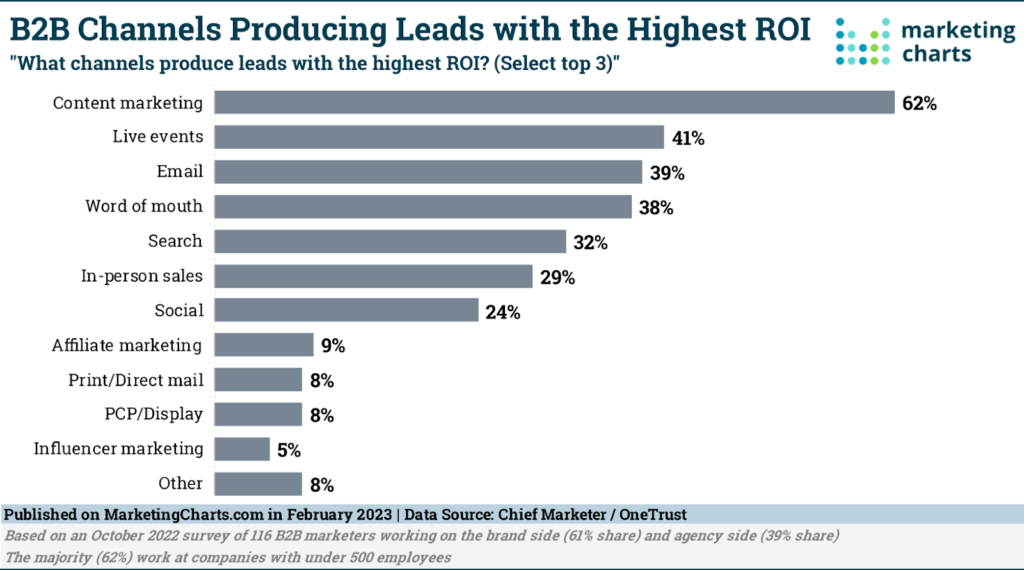As the dust settles and markets rebound from the global pandemic, one thing is clear: B2B marketing is not what it once was. In fact, content marketing has never been more important, or powerful, for B2B sales and growth.
Research from Netline shows that B2B content consumption surged by 33% from 2020 to 2021, largely due to shifting demands from the pandemic. With in-person events no longer possible, the majority of marketers transitioned their event budgets into digital content such as webinars, e-books and short-form video.
Now, as businesses move forward, the question is—can we return to our traditional strategies, or has B2B content marketing changed forever?
What is B2B Content Marketing?
Business-to-business content marketing involves creating and sharing valuable, informative content in order to attract attention from other businesses. B2B content creation is focused on providing solutions for specific problems business leaders face, in order to drive brand awareness, build trust and generate leads.
Common forms of B2B content include:
- Blog posts and thought leadership articles
- Whitepapers and research reports
- Case studies
- Infographics
- Webinars and online workshops
- Videos
- Email newsletters
- Social media posts
- Product demonstrations and tutorials
- Slide decks and presentations
Why is Content Important For B2B Marketing?
Content marketing serves as a means to educate your audience on the value of your products or services. While it’s true that successful advertising requires great content, it is not to be confused with content marketing. Each fulfills separate marketing goals for B2B businesses.
The primary goal of advertising is sales, but in contrast, content marketing seeks to nurture relationships and build brand awareness. For this reason, B2B content strategies are concerned with relating to stakeholder pain points, and detailing how your products or services can alleviate those pains for potential customers.
This educational approach is valuable at every stage of the customer journey, and is crucial for moving qualified leads into the sales funnel.
Content plays a pivotal role in building awareness, recognition, and trust for your brand. When the time comes for a customer to make a purchasing decision, your brand will be top of mind, thanks to the trust and authority you've established through your content.
B2B Content Marketing Is Shifting: What’s Different In 2024?
B2B companies continue to grapple with the new business landscape ushered in by the pandemic. Remote work, digital transformation, and changing buyer behaviors have all played a pivotal role in reshaping the B2B content marketing landscape.
As we step into 2024, it's crucial to recognize the evolving dynamics and how they impact your content strategy.
B2B Meets B2C
In recent years, B2B (business-to-business) content strategies have drawn heavily on content ideas and trends that were previously more successful in B2C (business-to-consumer) content marketing.
B2B content marketers are now adopting elements such as emotional connection, creativity, and personalization strategies, and are experimenting with new types of content. Data also shows that B2B investment into social media channels continues to increase, and is the most used marketing channel for both paid and organic traffic.
Snackable, Authentic Content
Remote work is no longer temporary, but a permanent fixture in many organizations. This shift has redefined how B2B professionals consume content.
With less face-to-face interaction, digital content has become the primary source of information. B2B marketers must adapt by creating content that caters to this remote audience, focusing on accessibility, engagement, and ease of consumption.
This shift in buyer behavior has driven the need for short, snackable content, and influenced the decline in the demand for hyper-technical content like whitepapers and case studies. This change is reflected in data from Isoline’s 2022 B2B Buyer’s Report.
The report reveals that videos and webinars are preferred by B2B decision-makers, and are now considered the most useful form of content for B2B marketing efforts. This marks a significant shift away from technical whitepapers and case studies, which previously ranked as most impactful in 2021.
Short-Form Video
As of 2022, 55% of B2B buyers around the world find video to be the most useful and valuable form of content in their buying journey. It should come as no surprise, then, that short-form video yields the highest ROI of any social media marketing strategy.
B2B marketers agree – 91% say the pandemic made short-form video more important for their brand marketing. Now more than ever, effective content distribution on social media is a leading concern for B2B digital marketing strategies, particularly due to the rise of short-form video.
@hootsuite Have a minute to spare? 👀 Learn the key findings from our Social Media Career Report here ☝️ #SocialMediaManager #SocialMediaCareer ♬ original sound - Hootsuite
As a B2B SaaS company, Hootsuite has embraced marketing through short-form video on TikTok, where they have built an audience of over 57,000.
Get Bold and Emotional with Branding
Over twenty years of data from IPA Databank illustrates that emotional appeal is at the core of memorable, engaging content that supports B2B buying decisions. As much as 70% of B2B buyers agree that emotionally engaging content is crucial for B2B content marketing efforts, as opposed to 30% who said rational appeals were more important.
B2B marketing leaders, such as Anamika Gupta of Fujitsu America, Inc, agree that customer relationships must be at the forefront of B2B content creation moving forward. As Gupta stated at The Drum’s Creative Transformation Festival, “at their hearts, both B2C and B2B marketing are about creating human-to-human connections.”
The Rise of AI
Artificial Intelligence (AI) is not just a buzzword anymore; it's a game-changer in B2B content marketing. ChatGPT and other natural language processing tools are revolutionizing the way we create marketing content, and it’s only just begun. This technology will open up new avenues for personalized and data-driven content strategies.
One striking example of AI's impact is Sherwin Williams' success in winning the 2022 B2B Creative Cannes Lions. In a competition that celebrates the boldest and most creative B2B marketing campaigns, Sherwin Williams' campaign stood out. They leveraged AI and natural language processing to create a smart assistant that helps customers choose the perfect paint colors.
How To Create A Powerful B2B Content Marketing Strategy
Research Your Target Audience
The foundation of any successful content marketing strategy begins with understanding your target audience. Start by answering the following questions:
- Who is our ideal customer?
- What are their pain points, needs, and preferences?
- Where do they consume information?
- What influences their decision-making?
- What is their buyers’ journey?
Conduct thorough research to create buyer personas, which will guide your content creation efforts and ensure your messaging aligns with your audience's interests.
Perform a Content Audit
Before creating new pieces of content, it's crucial to evaluate your existing content assets. A content audit involves assessing your current content for relevance, quality, and performance. Your content audit should assess:
- Performance Metrics:
- Page views
- Engagement rates
- Conversion data
- Content Quality:
- Readability
- Accuracy
- User Behavior:
- How users engage with the content
- Audience Demographics:
- Insights into your audience
- Feedback Analysis:
- User-generated feedback and insights
- SEO Performance:
- Search engine visibility
- Backlinks:
- Inbound and outbound links
- Keyword Rankings:
- How content ranks for relevant keywords
Consider the Marketing Funnel
Effective B2B content marketing considers the customer journey through the marketing funnel. From initial lead generation, such as awareness, through to post-purchase and retention.
Create content that caters to different stages of the funnel:
- Awareness: Blog posts, infographics, social media
- Interest: Ebooks, whitepapers, webinars
- Evaluation: Case studies, product demos
- Conversion: Free trials, samples, testimonials and reviews
- Post-Purchase/Retention: Email marketing, newsletters, how-to guides
Develop New Content Consistently
Consistency is key in content marketing. Establish an in-depth content calendar that outlines your publishing schedule and the topics you plan to cover. Regularly producing fresh, high-quality content keeps your audience engaged and returning for more.
Optimize Your Content for SEO
Search engine optimization (SEO) is critical for ensuring your content reaches a wider audience. Conduct keyword research to identify relevant keywords and phrases, and incorporate them strategically into your content. This helps improve your content's visibility in search engine results pages (SERPs).
Promote Content on Social Media
Social media isn’t just for B2C content! Leverage social media platforms to share your content with your target audience. Craft engaging social media posts that provide a glimpse of what your content offers and encourage users to click through to your website.
Remember: short-form video yields the highest social media ROI. Including short-form video in your social media content strategy will not only enhance your engagement but also boost your reach and brand visibility.
Experiment with Content Types
Diversify your content formats to cater to different learning styles and preferences. Experiment with blog posts, videos, infographics, webinars, podcasts, and more. Track the performance of each content type, using tools like Google Analytics, to understand what resonates best with your audience.
Keep in mind that B2B content demands are changing. Right now, video and webinars are the most effective options. Stay up-to-date and adjust your strategy accordingly.
Build Topical Authority
According to research from Forrester, trust is ranked as the most important brand attribute for B2B buyers. For CMOs overseeing B2B marketing strategies, it's crucial to position senior leaders within the company as industry thought leaders.
To do this, regularly publish expert content on relevant industry topics. Encourage your senior leaders to join webinars, podcasts, and speaking engagements to share their expertise. Also, connect with industry influencers and involve them in discussions to boost your brand's thought leadership.
Repurpose Your Content
Maximize the value of your B2B content by repurposing it into various formats. Convert a blog post into a video or craft an infographic to highlight key points. This approach not only extends the lifespan of your content but also broadens its reach.
And through strategies such as content syndication, you can spread the impact of a single piece of content, such as a thought leadership article, across multiple platforms and audiences without requiring significant extra effort from your marketing teams.
Embrace Change, Or Fall Behind
The world of B2B content marketing is evolving rapidly, challenging CMOs across the industry to adapt. Can traditional content marketing endure, or has it transformed forever?
The answer lies in staying flexible and ready for change. While traditional methods may have worked well in the past, they may no longer be as effective. Now is the time to reflect on your current strategy and review customer data to inform your next steps.
Embrace change, delve into innovative formats like short-form videos and authentic, snackable content. Do not be afraid to go bold, get emotional, or harness the power of AI to increase efficiency and explore your creativity.
And above all, keep your ear to the ground for developing trends! To make things easier on yourself, sign-up for The CMO’s newsletter to receive the latest industry insights, interviews and more straight to your inbox.




